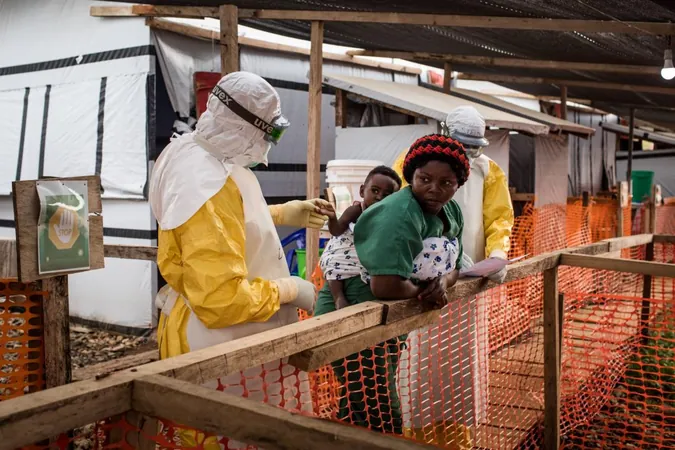
Ebola Outbreak in DRC: Urgent Response as Cases Surge
2025-09-12
Author: Daniel
The Democratic Republic of Congo (DRC) is grappling with a rising Ebola crisis, with at least 68 suspected cases reported across four districts in the Kasai state. As of now, 20 cases have been confirmed and a tragic 16 lives have been claimed since the outbreak was declared on September 4.
The first confirmed case emerged from Bulape General Referral Hospital, and alarming reports reveal that a nurse and a lab technician who treated the initial patient have also succumbed to the virus. Dr. Ngashi Ngongo of the Africa Centres for Disease Control and Prevention noted that this is the 16th Ebola outbreak in the DRC since the disease was first identified in 1976. However, genetic sequencing suggests this outbreak may be distinct, resembling the original strain from 1976 rather than more recent variations.
The remote location of the outbreak poses significant challenges, with delays in getting samples to laboratories, complicating containment efforts.
Global Response and Support
In an effort to combat the outbreak, the World Health Organization (WHO) has airlifted 12 tonnes of essential supplies, including personal protective equipment, sanitation materials, and resources for patient isolation. Dr. Mohamed Janabi, WHO's Regional Director for Africa, emphasized the difficulty of reaching affected areas, stating, "We are working round the clock to rapidly roll out response measures to ensure robust outbreak control and save lives."
Moreover, Médecins Sans Frontières (MSF) is collaborating with local health authorities and WHO to establish a treatment center at Bulape Hospital. MSF’s emergency coordinator, Brice de le Vingne, confirmed that their team is present in Bulape, providing critical medical supplies, training in infection prevention, and enhancing local triage protocols.
Vaccination and Prevention Measures
Currently, 68 health workers have received vaccinations from a stockpile of 2,000 vaccines available in the DRC. However, the Africa CDC warns of a significant threat to national health systems, especially for neighboring countries like Angola.
In response to the escalating threat, Bulape town has been placed under strict confinement to control movement, while contract tracing efforts are ongoing to identify more individuals who may have come into contact with the virus.
WHO is extending its support to ten neighboring countries, bolstering disease surveillance and emergency planning. Angola, in particular, is receiving assistance to enhance its preparedness, especially in the province of Lunda Norte, which borders Kasai.
Understanding the Ebola Threat
Ebola virus disease remains a rare but severe illness, often fatal in humans. The virus is transmitted from infected animals to humans, and human-to-human transmission occurs through direct contact with bodily fluids of an infected individual, or through contaminated objects. Given the current situation, rapid intervention and community engagement are critical to preventing further spread.

 Brasil (PT)
Brasil (PT)
 Canada (EN)
Canada (EN)
 Chile (ES)
Chile (ES)
 Česko (CS)
Česko (CS)
 대한민국 (KO)
대한민국 (KO)
 España (ES)
España (ES)
 France (FR)
France (FR)
 Hong Kong (EN)
Hong Kong (EN)
 Italia (IT)
Italia (IT)
 日本 (JA)
日本 (JA)
 Magyarország (HU)
Magyarország (HU)
 Norge (NO)
Norge (NO)
 Polska (PL)
Polska (PL)
 Schweiz (DE)
Schweiz (DE)
 Singapore (EN)
Singapore (EN)
 Sverige (SV)
Sverige (SV)
 Suomi (FI)
Suomi (FI)
 Türkiye (TR)
Türkiye (TR)
 الإمارات العربية المتحدة (AR)
الإمارات العربية المتحدة (AR)